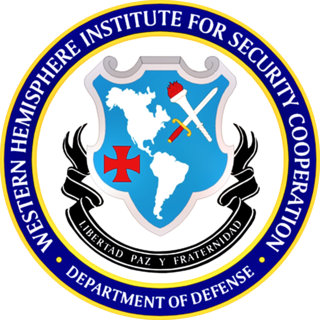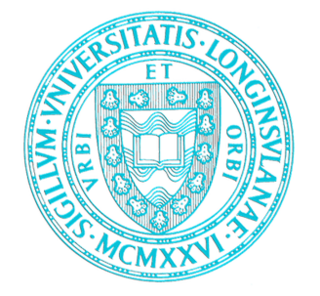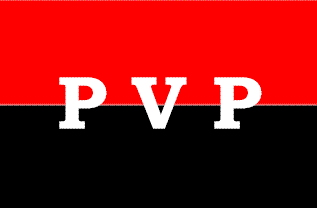Related Research Articles

The Western Hemisphere Institute for Security Cooperation (WHINSEC), formerly known as the School of the Americas, is a United States Department of Defense school located at Fort Benning in Columbus, Georgia, renamed in the 2001 National Defense Authorization Act.

Operation Condor was a United States–backed campaign of political repression and state terror by the right-wing dictatorships of the Southern Cone of South America. Operation Condor was officially and formally implemented in November 1975 and lasted until 1989. It involved intelligence operations, coup d'états, and assassinations of left-wing political opponents.

Long Island University (LIU) is a private university with two main campuses, LIU Post and LIU Brooklyn, in the U.S. state of New York. It offers more than 500 academic programs at its main campuses, online, and at multiple non-residential. LIU has NCAA Division I athletics and hosts the annual George Polk Awards in journalism.

Robert Edward White was an American career diplomat who served as US Ambassador to Paraguay (1977–1980) and to El Salvador (1980–1981). He then became president of the Center for International Policy.

The American Society for Engineering Education (ASEE) is a non-profit member association, founded in 1893, dedicated to promoting and improving engineering and engineering technology education. The purpose of ASEE is the advancement of education in all of its functions which pertain to engineering and allied branches of science and technology, including the processes of teaching and learning, counseling, research, extension services and public relations. ASEE administers the engineering technology honor society Tau Alpha Pi.

Veterinary education is the tertiary education of veterinarians. To become a veterinarian, one must first complete a degree in veterinary medicine.
The University of Chicago Divinity School is a private graduate institution at the University of Chicago dedicated to the training of academics and clergy across religious boundaries. Formed under Baptist auspices, the school today lacks any sectarian affiliations.

Marie-Monique Robin is a French TV journalist and documentary filmmaker. She generally issues books and documentary films together on the topics she investigates, in order to make more people aware of the issues she studies.
Sherry Beth Ortner is an American cultural anthropologist and has been a Distinguished Professor of Anthropology at UCLA since 2004.

The Partido por la Victoria del Pueblo, also known as the Party for the Victory of the People, or People's Victory Party (PVP), is a political organization in Uruguay. Its military wing is known as OPR-33. The leftist group began under an anarcho-syndicalist philosophy and was overshadowed by Tupamaros in Uruguay. The Party grew in strength among exiles in Argentina, both in followers and money, with $10 million from the successful ransom for a kidnapped businessman. Their planned guerrilla operation to reclaim their place in Uruguay went awry with the surprise 1976 Argentine coup d'état. Several days after the coup, three PVP members were arrested while attempting to cross back into Uruguay. Dozens of other group members were arrested in Argentina, including its leaders, in concert with Uruguayan security forces.
Several scholars have accused the United States of involvement in state terrorism. They have written about the US and other liberal democracies' use of state terrorism, particularly in relation to the Cold War. According to them, state terrorism is used to protect the interest of capitalist elites, and the U.S. organized a neo-colonial system of client states, co-operating with regional elites to rule through terror. This work has proved controversial with mainstream scholars of terrorism, who concentrate on non-state terrorism and the state terrorism of dictatorships.
Anti-communist mass killings are the politically motivated mass killings of communists, alleged communists, or their alleged supporters which were committed by anti-communists and political organizations or governments which opposed communism. The communist movement has faced opposition since it was founded and the opposition to it has often been organized and violent. Many anti-communist mass killing campaigns waged during the Cold War were supported and backed by the United States and its Western Bloc allies. Some U.S.-supported mass killings, including the Indonesian mass killings of 1965–66 and the killings by the Guatemalan military during the Guatemalan Civil War, are considered acts of genocide by some scholars.
The College of Arts and Sciences (A&S) is the liberal arts and sciences unit of the University of Kentucky, located in Lexington, Kentucky. It is primarily divided between the natural sciences, social sciences, and humanities, and offers more than thirty degree options for both undergraduate and graduate students.
Sarah J. Mahler is an American author and cultural anthropologist. She was part of a group of anthropologists attempting to change migration studies to a more comprehensive way to understand how migrants crossing international borders remain tied to their homelands and how cultural practices and identities reflect influences from past and present contexts, called "transnational migration."
Sherry J. Yennello is an American nuclear chemist and an Elected Fellow of the American Association for the Advancement of Science. She is a Regents Professor and the holder of the Cyclotron Institute Bright Chair in Nuclear Science, who currently serves as the Director of the Cyclotron Institute at Texas A&M University. She is also a Fellow of the American Chemical Society and the American Physical Society. She has authored as well as co-authored more than 530 peer reviewed journal articles and has conducted many invited talks, presentations and seminars at several prestigious academic conferences and scholarly lectures.

Participation of the United States in regime change in Latin America involved US-backed coups d'état aimed at replacing left-wing leaders with right-wing leaders, military juntas, or authoritarian regimes. Lesser intervention of economic and military variety was prevalent during the Cold War in line with the Truman Doctrine of containment, but regime change involvement would increase after the drafting of NSC 68 which advocated for more aggressive combating of potential Soviet allies.
Terry Lynn Karl is the Gildred Professor of Latin American Studies and Professor of Political Science specializing in comparative politics in the Political Science Department at Stanford University.
Laurel McSherry is an artist and Director of the Graduate Landscape Architecture Program at the Morgan State University School of Architecture and Planning in Baltimore. Previously, she was the graduate landscape architecture program director at Virginia Tech's Washington-Alexandria Architecture Center. Her design research work is award-winning and frequently focuses on rivers and their drainage basins.
The Study and Training Group for Military Reconnaissance was a highly classified clandestine unit of the foreign intelligence agency of Germany, Bundesnachrichtendienst (BND) from 1964 to 1979.
Marysa Navarro Aranguren is a Spanish-American historian specializing in the history of feminism, the history of Latin American women, and the history of Latin America. She occupies a prominent role as a promoter and activist in the areas of women's studies and women's history. Navarro is an expert on the figure of Eva Perón, having published her biography, and having written articles about her. Navarro lives in the United States, and has dual citizenship, Spanish and U.S.
References
- ↑ "Long Island University to Honor Outstanding Scholarship and Teaching: Eight faculty members to receive awards on April 24 (Press release)". 2008-04-23. Archived from the original on 2008-08-29. Retrieved 2008-05-20.
- ↑ J. Patrice McSherry (2005). Predatory States: Operation Condor and Covert War in Latin America. Rowman & Littlefield Publishers. ISBN 0742536874